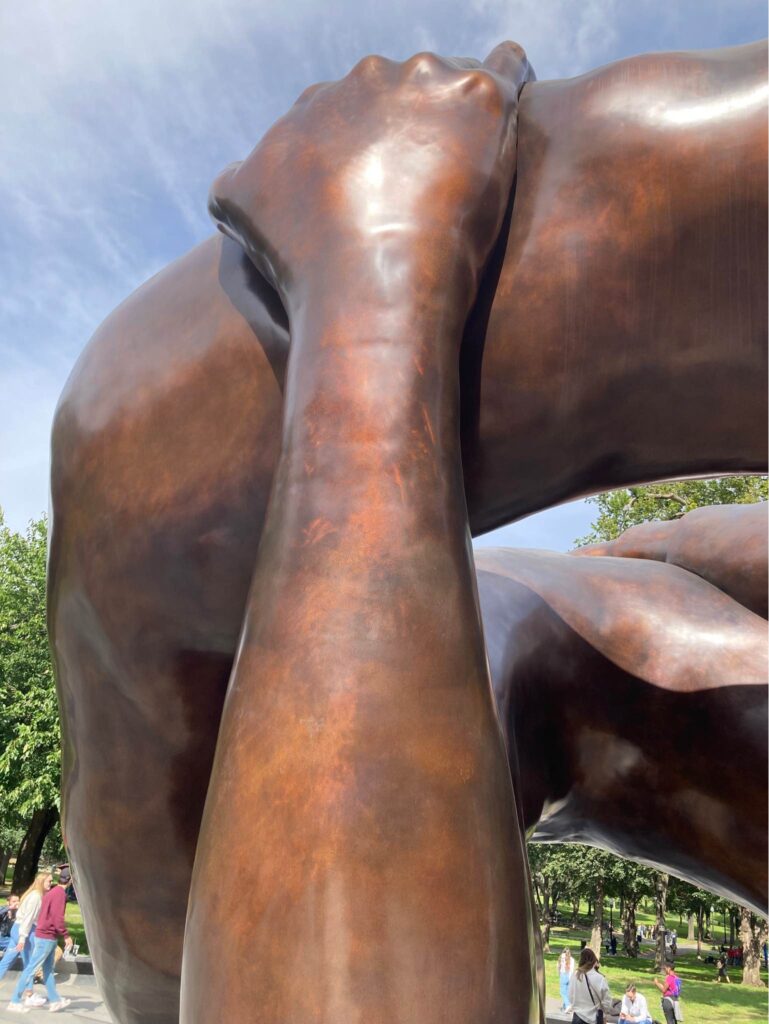
My lovely friends. Most of you look pretty much like me and share my lived experience as a white-identified woman. Dude friends, you’ve got one less intersection with me, but most of us still have the bond of shared whiteness, and that’s some powerful stuff nevertheless. Plus, we’ve mostly all got so much else in common, regardless of gender and perceived racialization: education, economic power, liberalism. So I’m talking today, for Martin Luther King, Jr. Day, primarily to y’all that I just named.
There is a section of Dr. King’s 1963 Letter from Birmingham Jail that absolutely haunts me. Do you know the part I mean? It’s about us white folks who say we believe in justice. Please stick with me for two paragraphs of Dr. King’s majestic words, and I’ll rejoin you a little further down the page:
“I must confess that over the past few years I have been gravely disappointed with the white moderate. I have almost reached the regrettable conclusion that the Negro’s great stumbling block in his stride toward freedom is not the White Citizen’s Counciler or the Ku Klux Klanner, but the white moderate, who is more devoted to “order” than to justice; who prefers a negative peace which is the absence of tension to a positive peace which is the presence of justice; who constantly says: “I agree with you in the goal you seek, but I cannot agree with your methods of direct action”; who paternalistically believes he can set the timetable for another man’s freedom; who lives by a mythical concept of time and who constantly advises the Negro to wait for a “more convenient season.” Shallow understanding from people of good will is more frustrating than absolute misunderstanding from people of ill will. Lukewarm acceptance is much more bewildering than outright rejection.
“I had hoped that the white moderate would understand that law and order exist for the purpose of establishing justice and that when they fail in this purpose they become the dangerously structured dams that block the flow of social progress. I had hoped that the white moderate would understand that the present tension in the South is a necessary phase of the transition from an obnoxious negative peace, in which the Negro passively accepted his unjust plight, to a substantive and positive peace, in which all men will respect the dignity and worth of human personality. Actually, we who engage in nonviolent direct action are not the creators of tension. We merely bring to the surface the hidden tension that is already alive. We bring it out in the open, where it can be seen and dealt with. Like a boil that can never be cured so long as it is covered up but must be opened with all its ugliness to the natural medicines of air and light, injustice must be exposed, with all the tension its exposure creates, to the light of human conscience and the air of national opinion before it can be cured.”
OK, it’s just me writing again. This passage is heavy on my heart these days, beloveds. Too many of our peers, if not ourselves, are feeling hesitant in our commitments to justice.
We wonder if the leaders of color and the movements for justice that we’ve admired for a few years now are going too far, or maybe just going too fast. We wonder about the language and the tactics they choose.
We wonder about our own fitness to speak; if we try speaking up in situations that feel risky, will we just mess it up and make things worse? For the cause we had hoped to advance with our words… maybe for ourselves, too? Will we pay a price, will we lose safety? Is this the right moment? Will there be a better one when we’re more ready in some way?
My loves. We have to take risks. Dr. King knew that he was risking his life. Everyone who marched with him – literally or metaphorically – knew that they were risking theirs. We are not. I mean, it’s theoretically possible that lifting our voices for justice will get us killed. But it’s vanishingly unlikely, for lots of reasons.
We may pay a price, yes. But we’ve spent our lives accidentally accumulating the power and privilege to pay that price. What else is it for, if not to protect what’s important to us? Isn’t justice important to us?
There’s another quote that comes up for me in this context. It’s from the most traditional of white American traditions: respect for the patriots of 1776. Let me reintroduce us here to Thomas Paine, and I’ll let him have the last word today:
“December 23, 1776
“THESE are the times that try men’s souls. The summer soldier and the sunshine patriot will, in this crisis, shrink from the service of their country; but he that stands by it now, deserves the love and thanks of man and woman. Tyranny, like hell, is not easily conquered; yet we have this consolation with us, that the harder the conflict, the more glorious the triumph. What we obtain too cheap, we esteem too lightly: it is dearness only that gives every thing its value. Heaven knows how to put a proper price upon its goods; and it would be strange indeed if so celestial an article as FREEDOM should not be highly rated.”
Onwards, friends. Always. ❤️